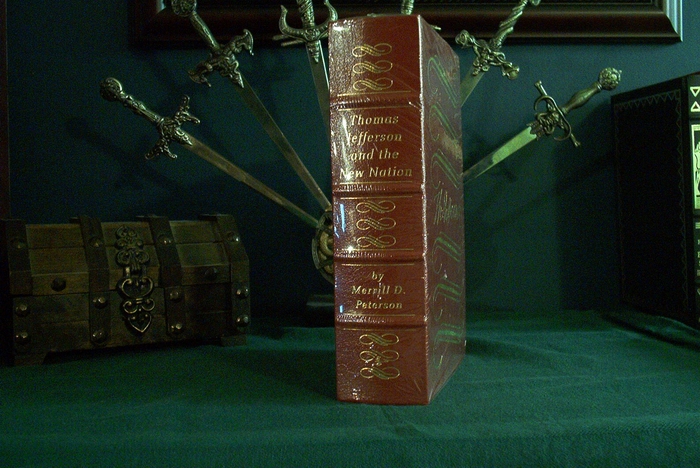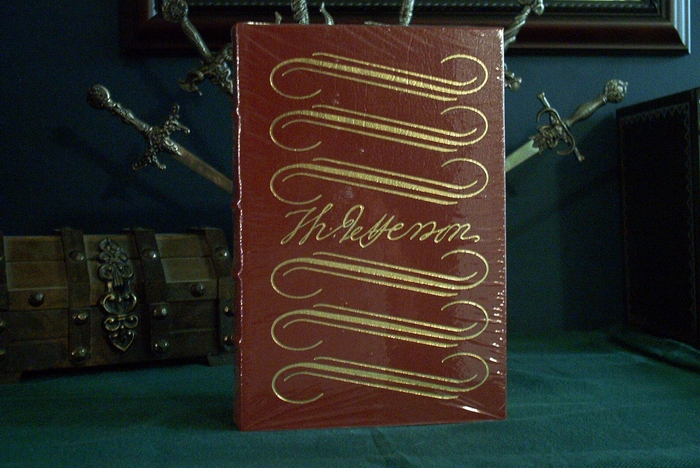Easton Press Thomas Jefferson books
Thomas Jefferson and the New Nation - Merrell D. Peterson - 1987
The Shackles of Power: Three Jeffersonian Decades - John Dos Passos - 1988
The Pursuit of Reason: The Life of Thomas Jefferson - Noble E. Cunningham - 1992
The Writings of Thomas Jefferson - 2 volumes - 1993
Thomas Jefferson and His Time - 6 volume set - Malone Dumas - 1993
Vol. 1 - The Virginian
Vol. 2 - Jefferson and the rights of Man
Vol. 3 - Jefferson and the ordeal of Liberty
Vol. 4 - The President (first term 1801 - 1805)
Vol. 5 - The President (second term 1805 - 1809)
Vol. 6 - The Sage of Monticello
Undaunted Courage: Meriwether Lewis, William Clark, Thomas Jefferson, and the opening of the American West. - Stephen Ambrose - signed edition - 1998
American Sphinx: The charter of Thomas Jefferson - Joseph Jay Ellis - 2000
President Thomas Jefferson biography
Thomas Jefferson, born on April 13, 1743, in Shadwell, Virginia, was a polymath, Founding Father, and the third President of the United States. His contributions to American history spanned politics, diplomacy, architecture, and education. Jefferson came from a prosperous and well-established Virginia family. He received an excellent education, studying at the College of William and Mary, where he developed a keen interest in classical literature, philosophy, and the sciences. Jefferson's intellectual curiosity would become a defining characteristic throughout his life.
In 1775, as tensions between the American colonies and Great Britain escalated, Jefferson entered the political arena. He was a delegate to the Second Continental Congress and was tasked with drafting the Declaration of Independence. His eloquent and enduring words, penned in the Declaration in 1776, expressed the fundamental principles of human rights and self-government. After the American Revolution, Jefferson served as the Governor of Virginia from 1779 to 1781. He then entered diplomatic service, representing the United States in France from 1785 to 1789. His time in France allowed him to witness the early stages of the French Revolution, influencing his political philosophy.
Thomas Jefferson assumed the presidency in 1801, defeating John Adams in a bitterly contested election. His presidency, often referred to as the "Revolution of 1800," marked a shift from Federalist policies to a more democratic and agrarian vision. Jefferson prioritized reducing the size and influence of the federal government, advocating for a limited government that respected individual liberties. One of Jefferson's most significant achievements as president was the Louisiana Purchase in 1803, which doubled the size of the United States. He also supported the Lewis and Clark Expedition to explore the newly acquired territory. However, his administration faced challenges, including conflicts with Barbary pirates and the embargo policy that aimed to protect American interests but had significant economic consequences. Jefferson's commitment to education led to the founding of the University of Virginia in 1819. He designed the campus and served as its first rector, reflecting his belief in the importance of education for a well-informed citizenry.
After his presidency, Jefferson retired to Monticello, his plantation in Virginia, where he continued his pursuits in science, architecture, and literature. He corresponded with many prominent figures of his time and engaged in discussions on political philosophy. Thomas Jefferson died on July 4, 1826, exactly 50 years after the adoption of the Declaration of Independence. His legacy endures not only for his role in shaping the United States but also for his intellectual contributions, including the ideals of individual liberty and the pursuit of happiness that remain fundamental to the American ethos.
Thomas Jefferson and the New Nation: A Biography
Thomas Jefferson and the New Nation by Merrill D. Peterson offers a captivating exploration of one of America's most enigmatic founding fathers during a pivotal era. With meticulous research and engaging prose, Peterson delves into Jefferson's multifaceted roles as a revolutionary leader, statesman, philosopher, and president. From his pivotal role in drafting the Declaration of Independence to his presidency and beyond, this biography sheds light on Jefferson's complex legacy and enduring influence on American democracy. Rich in detail and insight, Peterson's work is an essential read for anyone seeking to understand the remarkable life and times of Thomas Jefferson and the birth of the American nation.
The Pursuit of Reason
The Pursuit of Reason: The Life of Thomas Jefferson by Noble E. Cunningham offers a comprehensive and insightful examination of one of America's most influential founding fathers. With meticulous research and engaging prose, Cunningham delves into Thomas Jefferson's complex persona, from his role as the principal author of the Declaration of Independence to his presidency and beyond. Through a nuanced exploration of Jefferson's intellectual pursuits, political ideology, and personal life, Cunningham provides readers with a deeper understanding of the man behind the myth. This biography is an essential read for anyone seeking to unravel the enigma of Thomas Jefferson and his enduring impact on American history.
Jefferson and His Time
Dumas Malone's
classic biography "Jefferson and His Time" originally published in six
volumes over a period of thirty-four years, between 1948 and 1982 was
awarded the Pulitzer Prize in history and became the standard work on
Jefferson's life. Six volumes include:
Jefferson the Virginian
Jefferson the Virginian offers an illuminating exploration of Thomas Jefferson's formative years and his profound impact on the development of Virginia and the United States. With meticulous research and engaging prose, Malone traces Jefferson's journey from his upbringing in colonial Virginia to his emergence as a leading figure in the American Revolution and beyond. Through a rich tapestry of historical detail, Malone brings to life the complexities of Jefferson's character, his contributions to American democracy, and his enduring legacy as a statesman, scholar, and visionary leader. This captivating biography provides readers with a deeper understanding of Jefferson's roots, beliefs, and the pivotal role he played in shaping the course of American history.
Jefferson and The Rights of Man
Jefferson and The Rights of Man offers a captivating exploration of Thomas Jefferson's passionate advocacy for individual liberty and human rights. Through meticulous research and vivid storytelling, Malone delves into Jefferson's profound belief in the principles of the Enlightenment and his fervent dedication to securing these rights for all Americans. From his influential role in drafting the Declaration of Independence to his tireless efforts to defend civil liberties as president, Jefferson's commitment to the rights of man is illuminated in this compelling biography. Malone's masterful narrative sheds light on Jefferson's enduring legacy as a champion of freedom and democracy, making this book essential reading for anyone interested in the foundations of American liberty.
Jefferson and The Ordeal of Liberty
This is the third volume in Dumas Malone's monumental multi-volume biography of Thomas Jefferson, Jefferson and His Time.
Jefferson the President: First Term, 1801-1805
A
fascinating account of the details of Jefferson's first term, including
the Louisiana Purchase, his duel with the Supreme Court & continued
opposition to Hamiltonian doctrine, & his championing of science
& learning at home & abroad.
Jefferson the President: Second Term, 1805-1809
Jefferson the President: Second Term, 1805-1809 by Dumas Malone continues the captivating exploration of Thomas Jefferson's presidency, delving into his second term in office with meticulous research and engaging prose. Malone examines Jefferson's challenges and triumphs as he navigates the complexities of domestic politics and international affairs. From his efforts to maintain neutrality amidst European conflicts to his ambitious vision for westward expansion and the Lewis and Clark expedition, Jefferson's presidency is brought to life in vivid detail. Malone's masterful narrative sheds light on Jefferson's enduring legacy as a visionary leader and key architect of American democracy, making this book essential reading for anyone interested in the formative years of the United States.
The Sage of Monticello
The Sage of Monticello is a captivating and comprehensive exploration of the life and legacy of Thomas Jefferson. Through meticulous research and engaging prose, Malone delves into Jefferson's multifaceted persona, from his role as a revolutionary leader and founding father to his intellectual pursuits and personal relationships. From his visionary ideals of liberty and democracy to his contributions to architecture, science, and education, Jefferson's impact on American history is vividly portrayed in this definitive biography. Malone's masterful narrative sheds light on Jefferson's enduring legacy as a champion of enlightenment principles and a pivotal figure in shaping the nation's identity. This book is essential reading for anyone seeking to understand the complexities of Jefferson's character and his profound influence on the American story.
American Sphinx
American Sphinx: The Character of Thomas Jefferson by Joseph J. Ellis is a biographical exploration of one of America's most enigmatic and influential founding fathers. Ellis, a Pulitzer Prize-winning historian, delves deep into the complexities of Thomas Jefferson's character, shedding light on the contradictions and controversies that have long surrounded this towering figure in American history. Born on April 13, 1743, in Shadwell, Virginia, Jefferson came of age during a time of profound change and upheaval. He was a man of many talents: a brilliant scholar, skilled architect, passionate advocate for liberty, and visionary statesman. His pivotal role in drafting the Declaration of Independence and his subsequent service as the third President of the United States cemented his place in the pantheon of American heroes.
Yet, despite his many accomplishments, Jefferson remains a figure of enduring controversy. Ellis explores the paradoxes of Jefferson's life, from his eloquent defense of human rights to his ownership of slaves and his complex relationship with issues of race and equality. Through meticulous research and insightful analysis, Ellis paints a nuanced portrait of Jefferson, challenging readers to grapple with the complexities of his legacy.
American Sphinx offers a compelling examination of Jefferson's impact on American history and his enduring relevance in the modern era. Ellis's masterful biography invites readers to engage with the contradictions and complexities of Jefferson's character, offering fresh insights into the man behind the myth. This book is essential reading for anyone seeking a deeper understanding of one of America's most enigmatic founding fathers.
Thomas Jefferson quotes
"I hold it that a little rebellion now and then is a good thing, and as necessary in the political world as storms in the physical."
"The tree of liberty must be refreshed from time to time with the blood of patriots and tyrants."
"I cannot live without books."
"I prefer dangerous freedom over peaceful slavery."
"In matters of style, swim with the current; in matters of principle, stand like a rock."
"Honesty is the first chapter in the book of wisdom."
"I like the dreams of the future better than the history of the past."
"Educate and inform the whole mass of the people... They are the only sure reliance for the preservation of our liberty."
"When angry, count ten, before you speak; if very angry, a hundred."
"I'm a great believer in luck, and I find the harder I work, the more I have of it."


Comments
Post a Comment
Share your best book review and recommendation